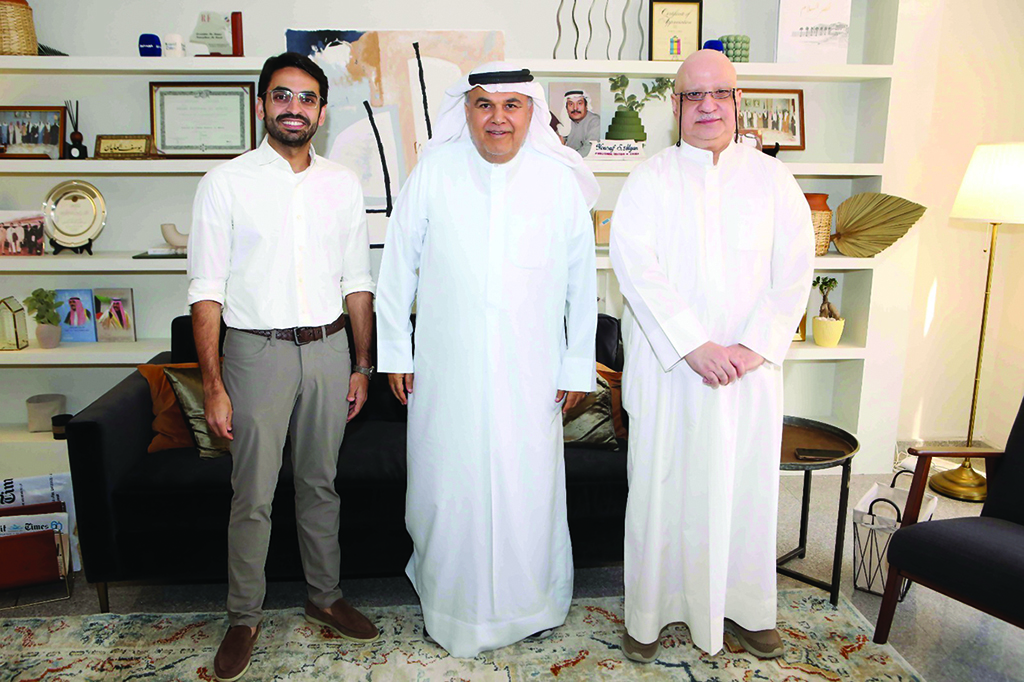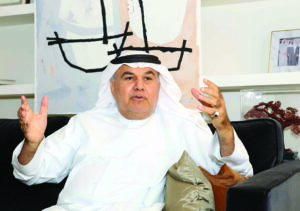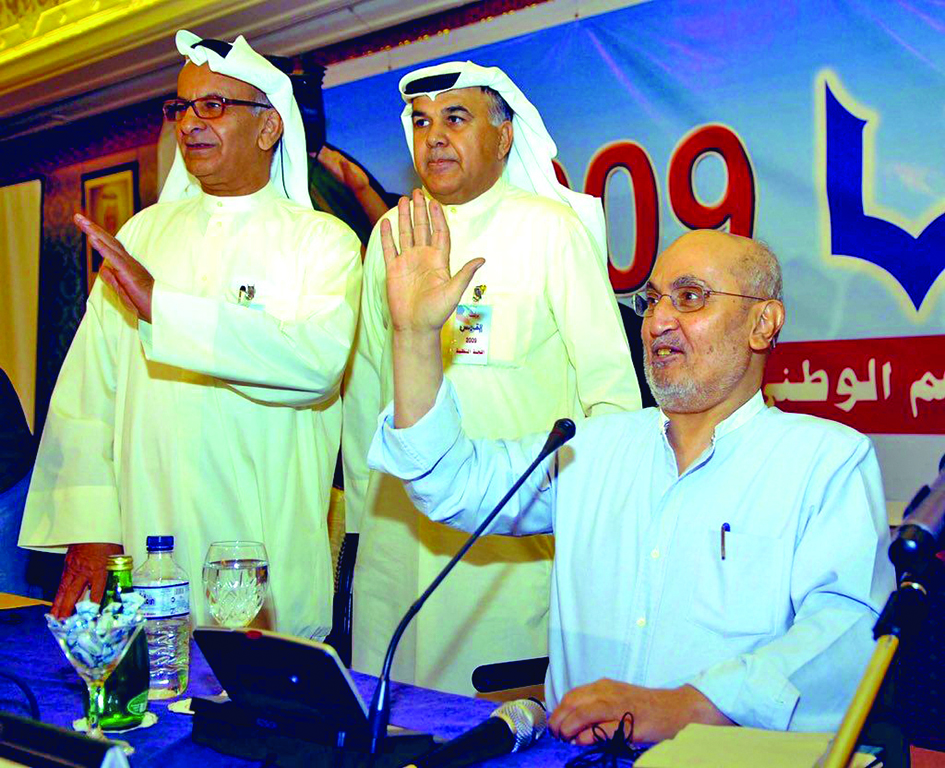By Mustafa Darwish
KUWAIT: Hussein Abdulrahman is a seasoned journalist with long years of experience in this field. Abdulrahman worked with Kuwait Times one of the many media houses where he left his mark. He has seen the ups and downs of journalism in Kuwait, and has been a part of many of these journeys. He spoke to Kuwait Times in an exclusive interview. Some excerpts:
Kuwait Times: How did you start with journalism?
Hussein Abdulrahman speaks to Kuwait Times.Hussein Abdulrahman: When I was young, in the late 60s early 70s, Chinese ships used to come to Kuwait. The Chinese had a philosophy of spreading Mao's principles and used to bring little booklets written in immaculate Arabic. I was influenced by Mao's philosophy, and from here my Arabic developed as I read those booklets.
I was also good in composition at Al-Mubarakiya School. Once when my teacher read what I had written, he beat me, demanding to know who wrote the piece for me. I told him my mother and father are illiterate, so he asked me how I had learnt the language. I told him about the books, so he told me not to go deep into the Chinese booklets as there are better books available, promising to bring them to me.
Also, whenever I got a page of Al-Rai Al-Aam newspaper, I used to fold it and put it in my desk. During composition class, when the teacher was speaking, I used to read the stories on the page, and from there was my start towards journalism.
In 1975, when I was studying in Cairo, I received a call from Mohammad Al-Barjes. He told me to become a student reporter with a weekly page of news about students, which I accepted. When I came to Kuwait a week later, I met him and we went to the paper. My first picture was published in Al-Rai Al-Aam, and I remained with them for nearly a year. My first salary there was KD 50, but I was embarrassed to go to the cashier to collect KD 50, so I waited for three months and collected KD 150.
At the start of 1976, our late colleague Olfat Fareed told me Al-Qabas' editor-in-chief wanted to see me and gave me his number. When I didn't call him, she insisted I should do so and see what he wanted, so I called his secretary, who informed me to come at any time. When I went and met him, he said he had read my work, praising that I had interviewed Egypt's army chief of staff and other dignitaries when I was still a university student. He told me to work with him, but said he cannot set my salary. He then took me to Editor-in-Chief Jassem Al-Nisf, who decided to give me a salary of KD 120.
Hussein Abdulrahman participates in a seminar with late MP Hamad Al-Jouan.So, I started in 1976 with Al-Qabas. I decided to be different and not imitate anyone, and have my own style. For example, every year high school results are announced, and the usual thing to do is to interview the top students. But I asked my colleagues to interview the bottom 10 students to find out why they had failed, because the number of failed students was large, and this indicated that there was a problem. We had a page with the headline "The failed dedicate their failure to the education minister" and demanded his resignation.
I published the pictures of the failed students with their statements and certificates with the failing marks. I then received a call from Mohammad Al-Saqer, who questioned me about what I had published. I told him the results show many students have failed and we must correct the problem, so he told me from now on he must see any material I write beforehand. An hour later, he called and told me that it was a good story, wondering how it came to my mind. I asked him 'Why were you angry earlier?' He said 'Minister Al-Rubei came to the paper and complained against you.'
When I used to submit any story, I used to go to the proofreaders after they finished to find the mistakes and learn from them. I developed myself in journalism and this gave me a personality in front of people. I did not want to ask questions that are expected or ordinary. When Dr Al-Adwani became health minister, I went to meet him two hours after he took the oath of office. My question to him was: 'If you do not achieve your goals, will you resign?' His answer was yes. In journalism, you should be different and look at things from a different angle.
Hussein Abdulrahman speaks with then Algerian foreign minister Al-Hadi Khudhairi on the Kuwait Airways Flight 422 (Al-Jabriya) hijacking.KT: If you can go back in time, will you take up journalism again?
Abdulrahman: No! The title of the book I am writing is 'Then I regret it'. It is true that I made a name for myself, but I worked hard for it. I made friendships and contacts inside and outside Kuwait. I was not looking for a position; rather I sought to have a good reputation. Any journalist who wants to have a good reputation must realize that this will cost him a lot. I tried to be different without taking anything away from my colleagues.
KT: Did you want your children to become journalists?
Abdulrahman: My son Ali is a broadcaster, and many people are talking about him. We instill etiquette in our children, as manners are priceless. Money comes and goes, but if you lose your reputation and morals, you cannot recover them, and no one can mend your credibility in front of people. We are a family that discusses politics and elections around the table.
Hussein Abdulrahman speaks with Sarif Ali bin Al-Hussein, an Iraqi politician who led a campaign to restore monarchy in Iraq.KT: What was the role of your wife?
Abdulrahman: I owe her a lot, as she carried a lot of burdens with me. She worked at a bank, then worked at the university with Dr Modhi Al-Humoud. When she used to bring exam papers to correct, she always turned the papers over so we couldn't see the grades. Dr Al-Humoud told me that may wife once refused a reward, saying she did not deserve it because she did not do extra work.
I worked at the university as an associate professor, but I was later let go because I wrote a series about many people who had forged degrees in 1985. There were those who claimed to have studied in the US, but could not speak English. I did my master's in the US and started a PhD, but did not finish it because I got preoccupied with journalism. Although I did not really need it, I later discovered I had made a strategic mistake.
Journalism is not a stable job, and one stays out a long time, but my wife coped and took care of our three children while I was away. For example, I covered the hijacked Al-Jabriya aircraft in Algeria and remained away for 16 days, but I was reassured because my late wife took good care of the children. If it was not for her, I would not be able to achieve what I did. I also covered the coup that took place in Sharjah. No other paper was present on both these incidents.
I am proud of my wife, and when she died on Friday, Aug 28, 2020 at dawn, I screamed, saying 'my back is broken now'. I thank God that she raised three children whom I am proud of and who have a good reputation.
Hussein Abdulrahman speaks with the late Prince Talal bin Abdulaziz Al Saud.KT: Did you speak to the liberated hostages?
Abdulrahman: Yes. I remained with them all the way from Algeria to Kuwait on the nine-hour flight. I have pictures with the hostages and another with Sheikh Abdulaziz Al-Qasimi, who assumed power in Sharjah following the coup. I asked to go and cover the coup and my request was approved.
When I arrived at a hotel in Dubai, I called the Sharjah governor's palace and requested an interview, which was granted. I took pictures of the governor as well as the troops around him, then sent the films by Kuwait Airways personnel to Mohammad Al-Saqer in Kuwait to be developed.
KT: Do you regret doing something in your journalistic career?
Abdulrahman: I haven't done anything that I regret, because I have certain values and principles. There is no way I will do something that will hurt a human being. An example: An MP submitted a parliamentary question about a secretary at a public company. He also sent the question to newspapers, but I thought it is not right for an MP to present a question to embarrass someone, so I called my colleagues and told them not to print the MP's question, because it is not a parliamentary question but made in revenge, and it was not published.
KT: Do you have anything to say to budding journalists?
Abdulrahman: Journalism nowadays is different from that in the '60s and '70s. Some journalists do not want to learn or take courses. Journalism has now become the profession of those who do not have a job. I organized some courses at KJA, and realized that the majority joined to collect a certificate.
There is no paper in the world that has two pages of columnists except in Kuwait. They write about the housing problem for instance, but there will be no numbers or statistics.
I was with the Managing Editor at Al-Qabas Raouf Shahrouri when a young man came to meet him. The man told him he wanted to write columns. Shahrouri told him 'Welcome!'. The young man asked, 'Can I write now?', so he replied 'Sure!'
The young man spent around 20 minutes away and returned. He gave Shahrouri a column, telling him this is for today, then another for tomorrow and a third one for later. Raouf became very angry and trashed the three columns. The young man demanded why he had discarded his work and ideas. He told him these are not ideas. He said if you want to write one column, go to the archives and read for hours, then sit and write. If you want to write about an issue, go and read about it. Nowadays, everyone wants to be a columnist, but does not want to work hard or develop themselves.
Another thing is that I do not like the word expatriates. We are a country that depends on residents in all aspects of life. Nowadays I am building a house, and since the start from the foundation all the way up, I did not meet a Kuwaiti. Even at companies that I visit to get offers and prices, I haven't met a Kuwaiti. They are serving the country, so why are we giving them a hard time!
If you have a business project, you should have a media project next to it to succeed.
KT: Do you read?
Abdulrahman: I read every day. When I wake up, I check the news on TV, then start reading. When I hear about a ruling, I read about its details, because it shows the way it's written and its vocabulary, and it educates you legally.
KT: A final word?
Abdulrahman: I thank you for this opportunity. I spend time with my grandchildren on Saturdays and buy things of benefit for them. I am very comfortable when I spend time with my family. When my wife passed away, I went through hardship and was advised to preoccupy myself with certain activities. I am now involved in some projects with Al-Qabas and am building a house.





